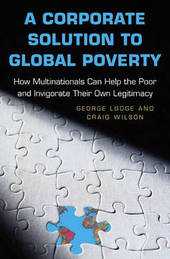
|
A Corporate Solution to Global Poverty: How Multinationals Can Help the Poor and Invigorate Their Own Legitimacy
Hardback
Main Details
| Title |
A Corporate Solution to Global Poverty: How Multinationals Can Help the Poor and Invigorate Their Own Legitimacy
|
| Authors and Contributors |
By (author) George Lodge
|
|
By (author) Craig Wilson
|
| Physical Properties |
| Format:Hardback | | Pages:208 | | Dimensions(mm): Height 235,Width 152 |
|
| Category/Genre | Development economics |
|---|
| ISBN/Barcode |
9780691122298
|
| Classifications | Dewey:338.90091724 |
|---|
| Audience | | General | | Tertiary Education (US: College) | | Professional & Vocational | |
|---|
| Illustrations |
12 line illus.
|
|
Publishing Details |
| Publisher |
Princeton University Press
|
| Imprint |
Princeton University Press
|
| Publication Date |
2 April 2006 |
| Publication Country |
United States
|
Description
World leaders have given the reduction of global poverty top priority. And yet it persists. Indeed, in many countries whose governments lack either the desire or the ability to act, poverty has worsened. This book, a joint venture of a Harvard professor and an economist with the International Finance Corporation, argues that the solution lies in the creation of a new institution, the World Development Corporation (WDC), a partnership of multinational corporations (MNCs), international development agencies, and nongovernmental organizations (NGOs). In A Corporate Solution to Global Poverty, George Lodge and Craig Wilson assert that MNCs have the critical combination of capabilities required to build investment, grow economies, and create jobs in poor countries, and thus to reduce poverty. Furthermore, they can do so profitably and thus sustainably. But they lack legitimacy and risk can be high, and so a collective approach is better than one in which an individual company proceeds alone. Thus a UN-sponsored WDC, owned and managed by a dozen or so MNCs with NGO support, will make a marked difference. At a time when big business has been demonized for destroying the environment, enjoying one-sided benefits from globalization, and deceiving investors, the book argues, MNCs have much to gain from becoming more effective in reducing global poverty. This is not a call for philanthropy. Lodge and Wilson believe that corporate support for the World Development Corporation will benefit not only the world's poor but also company shareholders as a result of improved MNC legitimacy and stronger markets and profitability.
Author Biography
George Lodge is Jaime and Josefina Chua Tiampo Professor of Business Administration Emeritus at Harvard Business School. In 1958, President Dwight D. Eisenhower named him Assistant Secretary of Labor for International Affairs, a position to which President John F. Kennedy reappointed him several years later. His books include "Managing Globalization in the Age of Interdependence, The New American Ideology," and "The American Disease". After spending nine years in the Australian foreign service, Craig Wilson worked for five years as a consultant economist with the World Bank and other NGOs. In 2005 he joined the International Finance Corporation and is currently based in Bangladesh, where he is managing a program aimed at improving the investment environment in South Asia.
Reviews"A Corporate Solution to Global Poverty provides a valuable--and exceedingly readable--primer on corporate social responsibility as well as a compelling approach to the use of corporate wealth to benefit the world's poorest."--Joshua Rosenthal, International Law and Politics
|